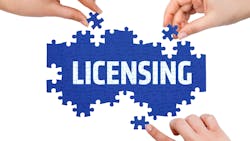The DDH Compact license for dental professionals is here—sort of
On April 22, 2024, an important event occurred for dental professionals’ licensure agreements.1 On that day, Maine Governor Janet Mills signed LD 2137, a bill that made Maine the seventh state to accept the Dentist and Dental Hygienist Compact (DDH Compact) license proposal.1 This adoption was especially important because the compact licensure could not be enacted without seven states initially accepting it. Now, history has been made and—for the first time—one license may allow dentists and dental hygienists to work in multiple states.
A bit of history about the DDH Compact
The timeline of the DDH Compact has not been a straightforward path. The compact license’s model of legislation came in January 2023.2 Both the National Center for Interstate Compacts at the Council of State Governments and the Department of Defense decided that more reciprocity between states for dental professionals could ultimately benefit both the underserved population who lacks dental care and reduce the number of job shortages among dental staff.
Together, the National Center for Interstate Compacts at the Council of State Governments, the Department of Defense, the American Dental Association, and the American Dental Hygienists’ Association have all been working behind the scenes to draft the DDH Compact so that it will allow dental professionals to easily move between states without compromising professional educational and ethical standards.1
More about the DDH Compact ...
- DDH Compact: Working toward dentist and dental hygiene license reciprocity across state lines
- Commentary: What's in the fine print of the DDH and AADB Compacts?
- Counterpoint: DDH Compact and license reciprocity
- Letter to the editor: Recent counterpoint on DDH Compact contains inaccuracies
Since January 2023, seven states have accepted the initial outline of the DDH Compact. Iowa was the first state to sign the compact license into legislation on April 27, 2023.3 Shortly thereafter, Washington State also signed. However, there were several months of stagnant waiting as 2024 came without much more acceptance from other states. Then, amazingly, more states’ governors—Wisconsin, Tennessee, Virginia, and Kansas—signed the legislation for the DDH Compact.1 Finally, the most exciting moment came in late April of this year with the seventh state signing the compact license into legislation and thus activating it.1
This means that any dental professional who is licensed in a state that has accepted the DDH Compact can work in any of the other six (or more) states that also accept the compact license without having to apply for individual state licensure.4
Despite having all the acceptance needed for activation, dental professionals still cannot apply for compact licensure. The compact license committee plans on meeting in the fall of 2024 to identify educational standards and data-sharing methods to monitor those dental professionals who apply for compact licensure.1 The committee will appoint commissioners to monitor each state’s bylaws that make up the DDH Compact to ensure they can monitor dental professionals’ licensure.1
Dental licensing requirements
Some dental professionals are concerned that educational standards for board licensure are being compromised by having a compact license; however, the committees assure the public that all professionals applying for compact licensure must be able to obtain a professional dental or dental hygiene license in their home state.1,5 Like current state dental licensing requirements, dental professionals must pass all national boards and jurisprudence examinations, hold a current CPR certification, and maintain continuing education credentials. It is estimated that it will be another year before a compact license is finalized for professionals to apply for.1
Where to learn more about the DDH Compact
Dental professionals anxious to apply for compact licensure should familiarize themselves with the webinars, news, and frequently asked questions found conveniently on the DDH Compact website.4 Any dental professional who wishes to learn more about licensure requirements, pending state legislation, or how to get their state to agree to the DDH Compact should contact the Council of State Governments..5 Currently, eight states are considering signing the DDH Compact into legislation, giving dental professionals even more opportunities.1
Editor’s note: This article first appeared in Clinical Insights newsletter, a publication of the Endeavor Business Media Dental Group. Read more articles and subscribe.
References
- DDH Compact reaches activation threshold with 7th state. The Council of State Governments. 2024. https://ddhcompact.org/2024/04/23/ddh-compact-reaches-activation-threshold-with-7th-state/
- Dentist and Dental Hygienists Compact. The Council of State Governments. 2024. https://ddhcompact.org/news/
- Iowa becomes first state to enact dentist and dental hygienist compact. The Council of State Governments. 2024. https://ddhcompact.org/2023/04/28/iowa-becomes-first-state-to-enact-dentist-and-dental-hygienist-compact/
- Dentist and Dental Hygienists Compact: frequently asked questions. The Council of State Governments. 2024. https://ddhcompact.org/faq/
- Klemmann D. Counterpoint: DDH Compact and license reciprocity. RDH magazine. March 27, 2024. https://www.rdhmag.com/career-profession/article/55000206/counterpoint-ddh-compact-and-license-reciprocity
Tracee S. Dahm, MS, BSDH, RDH, is an adjunct clinical instructor for the North Idaho College School of Dental Hygiene in Coeur d’Alene, Idaho, and she also works in private practice. She has been published in several dental journals, magazines, webinars, and a textbook. Tracee’s research interests include trends in dental hygiene and improving access to dental care for the underserved. Contact her at [email protected].
About the Author
Tracee S. Dahm, MS, BSDH, RDH
Tracee S. Dahm, MS, BSDH, RDH, is an adjunct clinical instructor for the North Idaho College School of Dental Hygiene in Coeur d’Alene, Idaho, and she also works in private practice. She has been published in several dental journals, magazines, webinars, and textbooks. Tracee is a key opinion leader on cutting-edge innovations in the hygiene field. Her research interests include trends in dental hygiene, improving access to dental care for the underserved, and mental health. Contact her at [email protected].


